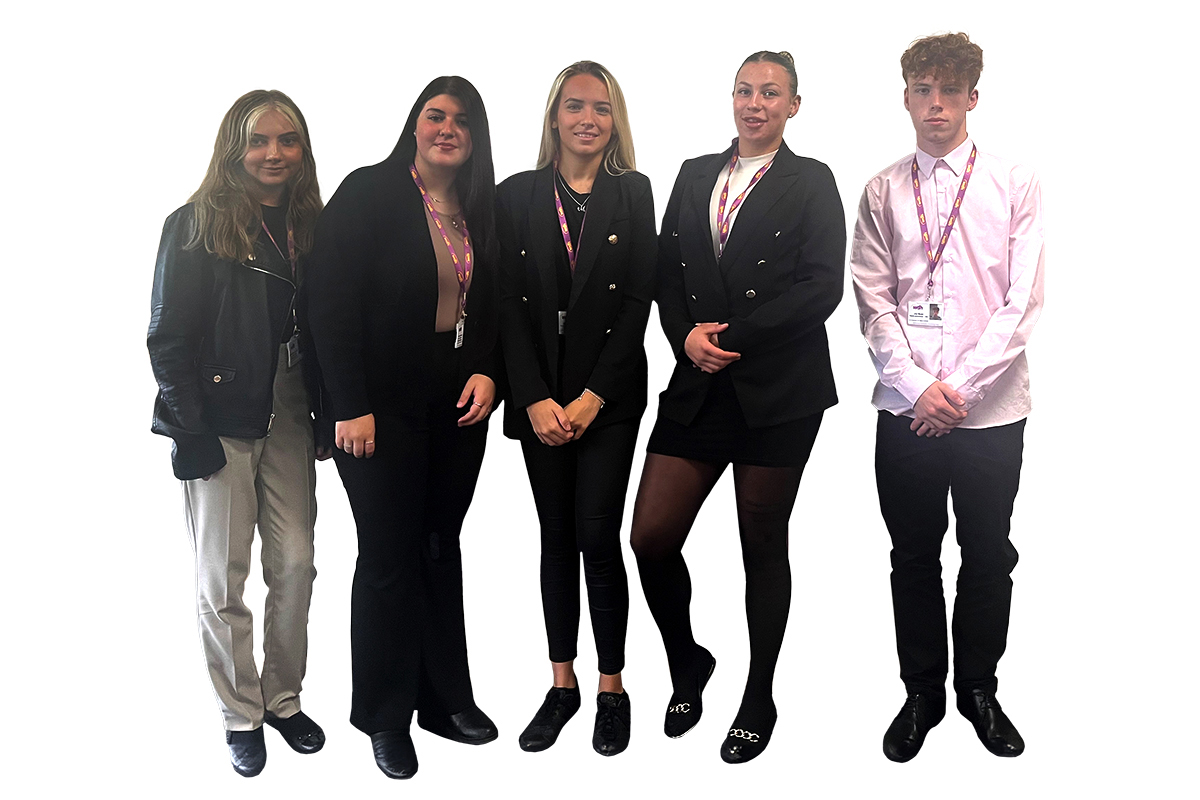Inside Housing visited the students at their placement at WDH, where they work within a range of different departments including corporate services, shared ownership and the technical services team.
Benjamin Porter, Head of Business, Leisure and Tourism at Heart of Yorkshire Education Group, also speaks about the Group’s effective working relationship with WDH and how this has enabled the students to embark on placements which truly enhance their learning.
Read the full article below or using the link: Inside Housing - Insight - How WDH is looking to create the workforce of the future
How one housing association is looking to create the workforce of the future
Housing association WDH has pledged to expand its training and employment offer to tenants and communities as it looks to create the “workforce of the future”.
In its 2025 business strategy, one of the housing association’s main priorities is to create a “workforce of the future”, with a pledge to expand its training and employment offer to tenants and communities. One of its strategic objectives (and there are only four) is to “be a positive force of leadership to develop the potential of people”.
Late last year, WDH teamed up with Wakefield College to deliver a brand-new T Level in Management and Administration. For the uninitiated, T Levels are an alternative to A Levels (the government describes them as “equivalent in size to three A Levels”) or apprenticeships, and run over a two-year period. A central part of the qualification is a 45-day industry placement to give students experience in the workplace and provide employers with “early sight of the new talent in their industry”.

Left to right: Briana Summerscales, Courtney Waine, Mia Gilpin, Lucy Dunford and Joe Mudd.
Before we explore how the partnership works, it is worth pausing for a second to ask why creating a “workforce of the future” is something that WDH is prioritising.Sarah Roxby, Executive Director of Housing at WDH, says everything the association does stems from its central vision of “creating confident communities”.
“We’ve always had a clear vision that our role is not just being about bricks and mortar, but very much about the people living in our homes and also the wider community and our estates. We’ve used that as a lever in our discussions with our partners. We’ve been able to say, ‘We’re a community anchor, we’re not going anywhere, we’re invested.’ And we’ve also got collective powers if we collaborate – we can achieve far more.”
The local context is important here. The 32,000-home housing association is West Yorkshire’s largest social housing provider and houses roughly a third of the population in Wakefield. As both a major employer and housing provider, it is stitched into the fabric of the community.
“It’s important that we play a role in tackling some of the issues we have [as a district],” Ms Roxby adds. “We’ve got increasing levels of deprivation. Across the partnerships we look at how we can tackle that and tackle health inequalities, and obviously access to employment skills and training is really, really key in that respect.”
The T Level in Management & Administration is a brand-new course and WDH is, for the moment, the big player in town. All but one of the course participants in 2023-24 are doing their 45-day placements (split into two to three week-long chunks over the course of the year) with WDH.Today we are meeting three of the seven participants: Lucy Dunford, 18, who has a placement with the corporate services department; Briana Summerscales, 17, who is working on shared ownership; and Isaiah Asher, 18, whose placement is with the technical services team.
Isaiah Asher, said: “So far my experience has been amazing. My expectations have been exceeded. I’ve been given three separate managers for different sections in my department – one is gas, one is electrical and one is repairs. All three managers come together to talk to me about what I’ll be doing in each block. This week I’m basically allocating jobs to in-field workers, so I’m talking to people and building communication skills.”
Mr Asher, who comes across as tremendously enthusiastic about what he is doing, says that before he started he was “not very confident”, but now he is engaging with people across a number of teams and “doing multiple different tasks and building different skills in one placement”. He is very complimentary about the way WDH has run things, too. “Essentially they’re setting their department up for me to succeed on my placement.”
Ms Dunford is similarly enthusiastic about her work with the corporate services team. Her role has involved everything from looking at risk management to managing the website.“I’m someone who likes a change, I like to mix it up, so this just fitted for me,” she says.
And the work that she has been doing at WDH has given her a head start in some areas of her wider coursework, she adds. “As soon as we finished the [first] two-week placement, we went back to College and we were doing risk management. When everyone else was learning, I had already learned it here.”
Ms Summerscales says she has enjoyed working in a team and the practical placement has helped her develop skills that are useful in the immediate term with her college work.“We do a different thing every day. We get to go on site [and see the homes], too. It’s not just being in the office all day.” Part of her role has involved checking property availability when potential customers make enquiries.
And the big question: would any of the three consider a career in housing? Ms Summerscales suggests she might. “I think it is a good environment to work in. I would probably work somewhere similar in the future.”
Ms Dunford adds: “It’s a nice organisation to work for… you’re giving back, which is nice.”
Benjamin Porter, Head of Business, Leisure and Tourism at Heart of Yorkshire Education Group, says WDH worked with it “right from the start” in terms both of embracing T Levels and planning the structure of the placement. From the point of view of a college, that means getting the placement right, but it also means employers, like WDH, get to influence course content.“We talk through the placement [with WDH] in terms of the kind of things that have been taught [before the students turn up for their placement] and what needs to be taught on the course as well,” Mr Porter says. “Ultimately the aim is to build those baseline skills and knowledge and then move on to the specialist skills and knowledge, so they are ready for employment.”Variety of roles
How does the placement work itself? The idea is that the students will work on four or five key projects, building digital and general skills in management and administration. At the end of each week of the placements, the students also complete written reflections on what they have done the previous week and the skills they have achieved, submitting evidence “wherever possible within GDPR rules”.
“From then, we triangulate with WDH and the service managers to make sure that progress has been made,” Mr Porter says.
“Each of our learners is red, amber or green-rated for key skills,” he adds. “Those skills that are green we know they have achieved in their placement so far, and those that are amber or red, we know that is a key bit of work we need to do both in college and that the team can be working on during the placement.” Each student will also work on one individual project associated with their role during their time at WDH.
As for the partnership with WDH, Mr Porter speaks in glowing terms about the association.
“The real reason we were so eager to work with them was because their values align with ours perfectly,” he says. “Their commitment to the community and the fact they want to give back really does align with what we believe ourselves to be as an inclusive college. You’ve also got that variety [of roles] for the learners at WDH, which you don’t have in some organisations. If a learner wants to focus on a finance pathway, or a marketing pathway, or whichever pathway it may be, then we can give them that.”
What about WDH itself? We’ve already discussed its wider role in the community, but certainly when the partnership was launched, Tim Craven, Social Investment Manager at WDH, said of the aim: “As a business, this also enables us to create a talent pipeline, while giving our existing employees the opportunity to continue developing through the mentoring of students.With the T Levels I’m sure these young people will go away with a qualification and will use their WDH days to help benefit them and progress in their lives,” Mr Craven says. “To help them go to university or a job – whatever it is they want.”
“Our priority is the community, to raise the aspiration of young people generally, that’s our driver. If it helps with our recruitment, that’s a bonus, an added extra.”
Are there lessons for housing associations or councils that might be looking to strike up their own partnerships with education providers? For Sharon Poole, Social Inclusion Manager at WDH, it is important to build feedback into every part of the system.
“I think the big thing is feedback from everybody: the managers, the tutors [as well as the students]. We obviously want to work with the managers [at WDH] because we want them to keep supporting placements. So, we’re making sure we hear their voice and what is working well for them.”
Feedback might address issues such as a young person turning up late, or perhaps making sure they are trained in basic skills such as Excel before they arrive.
Although the government has pledged to scrap T Levels and merge A Levels and T Levels into a new Advanced British Standard, everyone in the room feels they have been a valuable approach – and that whatever happens, there is learning from the programme to feed into future approaches.
